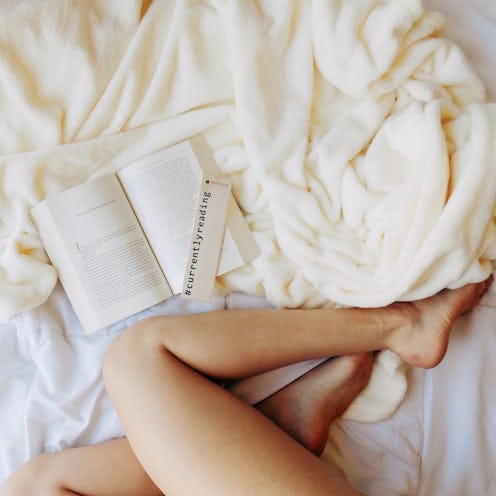Books
I Started Sleeping Better By Doing This
Whenever anyone asks me how I am doing, one word comes to mind: exhausted. It's a response I hear from almost all of my peers, which got me wondering, why are we all so tired all the time? It could be the anxiety of the Trump presidency or millennials' particular addiction to coffee, but I had a different theory: too much TV. That's when I decided it was time I did something about my bad habit of constant entertainment streaming, and found out how much reading before bed helped me kick my nightly TV addiction and sleep better.
My nightly routine hasn't been the same since.
I have never been great at sleeping, or rather falling asleep. My parents used to joke that I could sleep through a parade in my bedroom, but getting me to close my eyes and go to bed in the first place was always a struggle. From a very young age, I was the kind of kid who got in trouble for staying up reading or journaling late into the night. Sometimes, my mom would even come home from her second shift job to find me under the blankets with a flashlight and a book well after midnight.
Since those early days of distracting myself from sleep, I have always had a hard time committing to a full eight hours of shut eye. When I moved away for college in 2012, things only got worse. Whether it be the noise of my roommate sleeping, the sounds of my hall mates partying, or the random noises that come along with sleeping in a new place, I found myself awake through the night. Most nights, I turned to my studies — okay, or a friend's party — to keep the Sandman at bay, doing anything I could to avoid dreaded sleep, which I found to be an anxiety-inducing waste of time.
That is, until I discovered Netflix, Hulu, and Amazon Prime.
When I first streaming services my junior year in college, I used to love throwing them on in the background while I studied, did homework, made dinner, got ready for a night out, and, eventually, tried to fall asleep. It became my new nightly routine: brush teeth, wash face, open laptop, turn TV on. I can't tell you how many times I stayed up well past 2am watching an episode of Buffy or Friends for the hundredth time. There was something comforting about the fact that, even as I drifted off to sleep, there was something there for me, there was something I was doing, even if it was just zoning out to a show or a movie I had already seen.
When I moved to New York for work after graduation, my streaming addiction came along with me and all of my stuff. The city was even louder than my college campus, and my roommate's sleeping habits didn't help things, either. I found that no matter what time I got home from work or the bars, no matter how early I had to get up to babysit or go to the gym the next morning, I would still plug in every night and procrastinate my bedtime. It got to the point that I didn't think I could fall asleep without TV in the background, a bad bedtime habit a lot of people have.
But now I am 27, and as hard as it is for me to admit, I just can't hang like I used to. I may still have the same hang ups around sleep, but no matter what my mind thinks, my body can't handle three or four hours of crappy, TV-induced sleep anymore. I have started to feel constantly tired, chronically exhausted, and frustrated with myself for not treating my body better.
That's when I decided it was time to turn off the TV and find another way to help me cope with my sleeping anxiety. I knew I was still going to need some form of bedtime procrastination, as bad as it is for me, but I also knew it couldn't be something as distracting, disruptive, and unhealthy as entertainment streaming anymore. So I turned to the same place I often do for answers: my bookshelf.
Reading has been scientifically proven to be good for your health in a lot of ways, and helping you sleep better is one of them. It reduces your stress level, calms your nervous system, and helps you relax your mind, even as you use it. Unlike watching the bright white lights of a TV, phone, or computer screen, looking at a book won't keep you up, but rather help you drift off to a restful night of sleep.
For the last two months, I have made an effort to leave the screens away when it's time to go to bed, and pick up a book instead. In my mind, it serves the same purpose as watching TV always has: it keeps me from having to close my eyes and force sleep to overtake me. Instead, it has given me an activity to distract me from my anxiety around bedtime while simultaneously sending me off to dreamland for a full night of peaceful, restful, distraction-free sleep.
I'd be lying if I said there weren't still those nights that I stayed up far past my bedtime, sucked into a truly terrific page-turner, but now that I leave my Netflix and chilling for normal TV watching hours, I can say with all confidence: I don't hate bedtime anymore.
